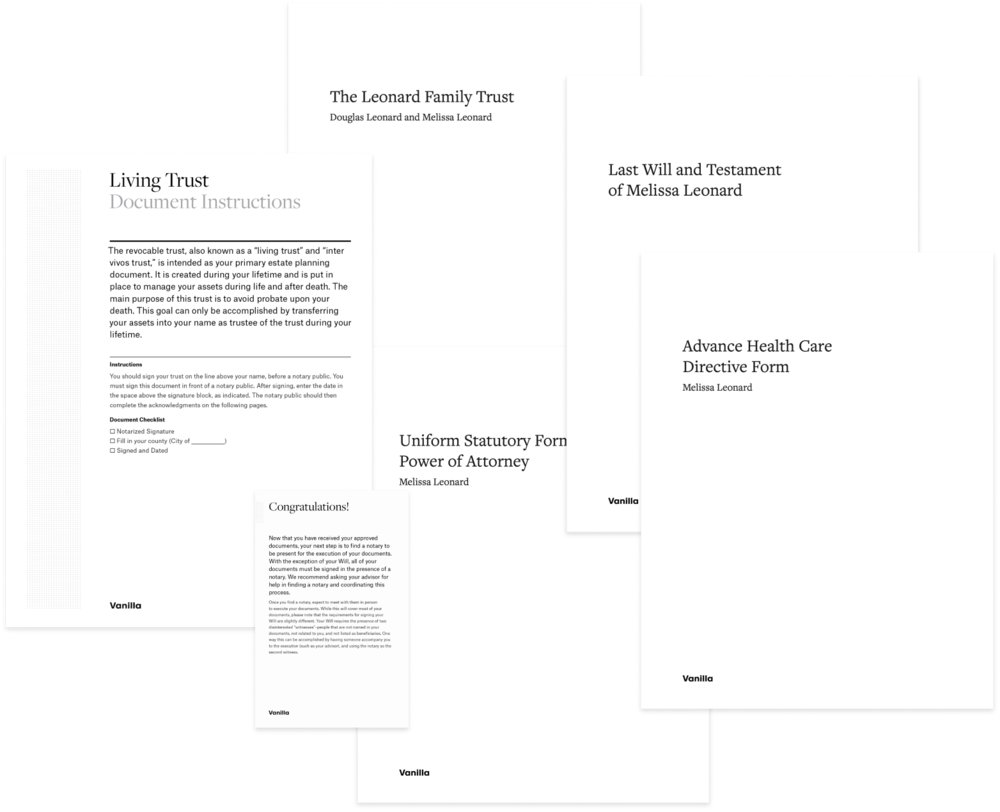 Vanilla
Vanilla
How do I know if estate planning documents are high quality?

As a financial advisor, you may be uncertain about the myriad of estate planning documents clients use, and which to recommend for the best possible financial outcomes for your client.
Estate planning documents come in all shapes and sizes, but good planning documents need to address specific, important details. To help you sort through your clients’ paperwork, here’s how to discern if all those forms are well executed, high-quality estate planning documents.
High-quality estate planning documents are updated regularly
Thinking about the future and completing estate planning documents is an excellent first step, but your client’s financial situation is bound to change during their lifetime. You should review estate planning documents with your client regularly, including when they experience a major life event.
Completing estate planning reviews in-house means you can make estate planning part of your routine business with your client, ensuring you do reviews annually or as necessary.
Items to review include:
-
Major life events. Your client’s estate planning documents should reflect major milestones. These life events include having a child, diagnosis of a significant illness, divorce, death, moving to a new state, or marriage.
-
Notable changes in assets. An increase in assets without appropriate tax planning could leave your client with significant estate tax, which would leave less for their beneficiaries.
-
Major changes in the law. To the extent they are known and applicable, major changes in the law at both the state and federal level can impact your clients. For example, major tax law changes were implemented in 2012 and 2017. As of 2022, the estate tax exemption for an individual is $12.06M ($24.12M for married couples).
High-quality estate planning documents name current trustees
When your client selects a trustee — the person who will manage the trust — they think they’ve chosen someone who will make the best decisions for their family. However, relationships change over time, and your client may need to reconsider their trustee appointment.
Keep these factors in mind when reviewing your client’s trustee appointments:
-
Is the selection current? If not, your client should remove or replace the trustee. Outdated trustees may find it more difficult to execute your client’s wishes or may no longer be the best person for the role.
-
Will the person represent the best interest of your client’s family? People and situations change. You want to ensure that your client has chosen a trustee who understands their wishes and will carry them out with the utmost integrity.
-
Does the person have the necessary skills to be an effective trustee? Although it is not necessary that the trustee your client selects be a professional, that person should generally be organized, responsible, and dependable.
-
Will the person be alive when your client needs a trustee? Some of the most trusted people in your client’s life may be significantly older than them. Encourage your client to consider whether their chosen individual will be around to enact their wishes. Don’t forget to ask your client about any declines in the trustee’s mental or physical health.
-
Is the person a U.S. citizen? If your client’s trustee is not a U.S. citizen, the trust may become a “foreign trust.” A foreign trust is subject to laws outside of the U.S., even if the original trust was created by a U.S. citizen, with all the assets and beneficiaries located in the U.S.

High-quality estate planning documents protect assets
It would be much easier if all of your client’s assets were in one place and, upon their death, those assets automatically transferred to the next generation without fear of probate or creditors. But that’s not the way it works. Your client needs a strong, documented estate plan that includes protections so their assets aren’t subject to creditors or don’t end up in probate, potentially frozen for years and whittled away.
To protect your client’s financial distributions, ensure their documents address the following issues:
-
What if your client fails to re-title all of their assets to the trust during their lifetime? If this occurs, your clients documents should contain mechanisms like a pour-over will or general assignment of assets to help clarify their intent that the assets be included in their trust.
-
How can you help your client protect their assets from creditors? Many trusts have mandatory distributions of principal to beneficiaries at certain ages. This common age-based distribution practice is risky because it can leave assets subject to creditors or the assets could become marital/community property, with half lost in the case of a divorce. To protect your clients, make sure their estate planning documents don’t call for mandatory distributions.
-
Can your client use exemptions if their estate becomes taxable? If your client has significant assets, make sure the estate planning documents account for any applicable tax planning and provide for the maximum flexibility possible.
-
How should your client include their retirement in their estate plan? Retirement assets often are one of the most valuable assets a client has. Failure to plan for retirement beneficiaries in an estate plan means the assets won’t be designated properly and/or the right beneficiaries won’t receive the full benefits. If a client’s spouse is the primary beneficiary of a retirement plan, it then becomes within their control to designate beneficiaries after the spouse’s passing.
-
Does your client’s document include digital assets? Digital assets—like social media accounts, credit card rewards, frequent flyer points, virtual currencies, and income-generating websites—are relatively new to consider. The most recent study, published in 2011, found that the average American has about $55,000 in digital assets. Your client needs to plan for the distribution of these assets as well so they’re not lost.
High-quality estate planning documents provide flexibility for life changes
Your client’s life will inevitably change, and estate planning documents need to have the flexibility to change with them.
Factors that signify flexibility in estate planning documents include:
-
The documents allow for a change of situs. Your client might need to change the state (and, therefore, the state laws) where the trust is carried out depending on taxation and the location of assets, trustees, and beneficiaries.
-
The documents include a decanting provision. In other words, can assets within the trust be moved to another trust? A client might want to decant their trust if it has outdated terms, allowing them to leave unwanted terms behind and fund a new trust through the former one.
-
The documents enable your client to appoint a trust protector. A trust protector (a person or a group of people) oversees the trustee to ensure they carry out your client’s wishes.
Keep clients close and their assets secure
Estate planning offers another opportunity to give your clients valuable advice about their finances. The task of sorting through this paperwork doesn’t have to be intimidating if you know what to look for in high-quality estate planning documents. Understanding the basic traits of high-quality estate planning documents will help you guide your clients. Ready to change the way you serve your clients? Get in touch to get started.
Protect your clients’ wealth and legacy with Vanilla
https://www.justvanilla.com/demo
This article is for educational purposes only and should not be considered legal advice. If you feel that the information in this article is pertinent to your situation, you may wish to consult a qualified attorney for advice tailored to your circumstances.
Published: Sep 16, 2020
Holistic wealth management starts here
Join thousands of advisors who use Vanilla to transform their service offering and accelerate revenue growth.
